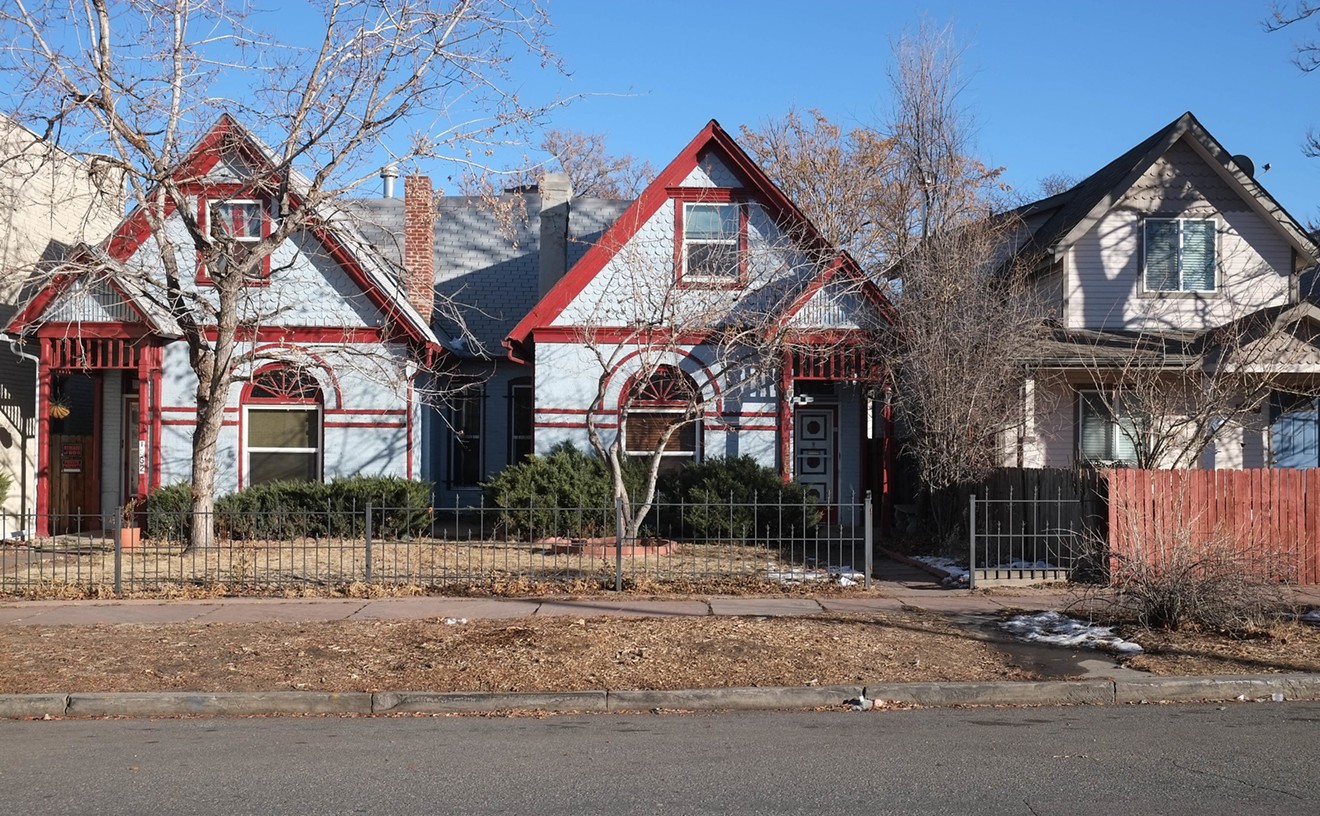Stock's dismissal, previously recounted in these pages (Feedback, March 4), came after his February 23 attempt to give away a $300, Coors-provided snowboard to the first person willing to engage in a sardonic act of road rage. Listener Tom Teehan bit, stalling his thirty-foot truck in the right-hand lane of eastbound Hampden Avenue at half past eight that evening. But any giggles Teehan's action generated soured when unamused representatives of the Cherry Hills Village Police Department arrived on the scene and told him that the stunt had nearly caused a three-car pileup. Teehan eventually came out of the situation in decent shape; he got his snowboard, at least. But for cooking up the scheme, Stock was sacked by Peak program director Mike Stern, who learned of the incident during his first day at the station, and he later was sentenced to a year's probation and forty hours of community service after being convicted of making a false report to authorities. "Nothing ever happened to the Peak," Stock notes. "They just sort of snuck away, and I took the blame for them; I even had to get my own lawyer. But enough time has passed that I can almost laugh about it."
No doubt Stock's sense of humor has been enhanced by his new gig as program director of the alternative format of Lycos Radio, a musical appendix to Lycos, one of the cyberworld's most popular search engines. Although Lycos's corporate headquarters is in Boston, its radio component is provided by Westwind Media.Com, based in downtown Denver -- and as such, the service's five branches ("Adult Contemporary," "Country Now," "Smooth Jazz" and "Hip-Hop/R&B" are the others) have a distinctly Colorado flavor. Marty Lenz, an afternoon jock at KHIH, is the program director of the smooth-jazz format, and since he started in April, Stock has built the alternative wing around the likes of Dave Granger, a onetime KTCL star whose pirate radio station was recently shut down by the FCC ("End Transmission," July 29), and Mike Makkay, KTCL's longtime morning man. Stock believes that Makkay, Granger and other former mainstreamers are attracted to the Web by the freedom it offers. "All of us take what we learned in traditional radio, throw it out the window and do things our way," he says. "Which way that is, we don't know yet. We're still experimenting. But that's the fun of Internet radio."
Under Stock, Lycos Alternative (accessible at www.radio.lycos.com) is offering a number of specialty shows, many of them focused on punk rock, a particular favorite of international listeners: "We hear from a lot of people in Sweden and the U.K. about that," he points out. As for the majority of the other programming, Stock says he's shooting for a more challenging blend of sounds than is commonplace on local broadcast radio. "I take a look at what the current hits are, but mostly to see what I won't play. You won't hear Sugar Ray on our station, and if you hear the Red Hot Chili Peppers, you won't hear the songs that everyone else is hammering at. We like to mix familiar bands with indie rock and other stuff so it won't seem totally obscure, and it works great. On normal radio, I've never understood why bands like Fugazi couldn't be played with the Chili Peppers, or how a band like Collective Soul could be considered alternative at all."
The public seems to be responding well to the Lycos way; the radio site as a whole generally receives between 65,000 and 90,000 hits a day. But Stock concedes that these numbers have not yet translated into a financial bonanza. "We're going through growing pains, and we're not seeing a whole lot of revenue yet. But the potential is definitely there for making a great deal of money."
Mike O'Connor, the program director for classic-rock outlet the Fox and alternative-minded KTCL, couldn't agree more; he's the driving force behind new Internet-only spinoffs from the two stations -- The Adventure 2, at www.ktcl.com, and Fox 2 Deep Cuts, at www.thefox.com. But thus far, these creations are minor variations on familiar themes done on a relatively small scale. The Adventure 2 essentially consists of one hour of programming per week, with many of the songs coming from releases by artists who are being pushed by major imprints or acts getting airplay on KTCL with other current songs. Last week, for instance, a Chemical Brothers tune, "Out of Control," was the spotlighted Web item, with big-label groups such as Dangerman, Stereophonics and the Bloodhound Gang also getting exposure. Likewise, Fox 2 Deep Cuts (also an hour a week) mainly sticks with the tried and true. "It's designed for the older half of the audience that misses some of the late-Sixties/early-Seventies classics that we don't play as much as we used to," O'Connor says. "But that doesn't mean we won't also throw on something like a less familiar song by Stevie Ray Vaughan."
Fox 2 is so new that O'Connor cannot yet gauge its popularity, but he's confident that the audience will embrace it. Meanwhile, KTCL is aggressively promoting The Adventure 2, whose most popular songs are then moved to the mother station's playlist. Still, he doesn't want to create impossibly high expectations about the Internet venture. "In an ideal world, Adventure 2 would be a 24-7 station with its own DJs and an expanded playlist," O'Connor says. "The reality, though, is that it's a glorified mix tape." He adds, "It's been hard to convince the parent company [Dallas's Clear Channel] to do something like this when there's more expense than revenue. But if we're not careful, radio could get left in the background by these aggressive Internet upstarts."
That's the hope of Tom Grant, who with partner David Lampe runs one of Colorado's most entertaining dance-culture Web outlets, Localstation, at www.localstation.com. Unlike O'Connor's enterprises, Localstation isn't financed by a giant conglomerate; Grant and Lampe pay for it by designing Web sites for car dealers and other clients. But a lack of moolah hasn't prevented them from assembling a treasure trove for techno and electronica enthusiasts. "We have over sixty DJs helping us out," says Grant, once an employee of AOL's Digital City. "Most of them are from Denver, but we've also got DJs from all over the United States -- Florida, New York City, Arizona, Washington State -- and even from places like Scotland. You can listen to them by genre or DJ, and we also have a channel that randomly picks from all the music we have, so you can get a real variety."
Thanks to features like these, Localstation has been steadily building a following since its January debut; it's now racking up 20,000 unique visits a month. However, that's less than half the total that stops by the KTCL and Fox sites (both are now in the 50,000-visitors-per-month range), in large part because the stations are being hyped over the airwaves. Clearly, the big boys are moving in, making life infinitely more difficult for idealists like Grant. But he's not about to surrender. "I'll support Localstation until I'm totally out of time and money, because it's been so much fun," he says.
Fortunately for Stock, he's in a more financially secure position. "It's great to have a company like Lycos behind us," he says. "They're one of the biggest portholes out there, so you get a lot of hits every day, no matter what." But as a music lover, he wants to see Grant and other Internet pioneers succeed as well. "Let's all work together to bury traditional radio," he says. "It's time for the industry dinosaurs to step aside."
On September 1, the Denver Post published a front-page article filled with superlatives about its new editor, Glenn Guzzo, offered up by Post execs and pros who'd worked with Guzzo at the Philadelphia Inquirer and the Baltimore Sun. But there were no specific quotes from spokesmen at the Akron Beacon Journal, where Guzzo, who's set to take the Post helm this week, served as managing editor for the past six years. And that's too bad, because insiders tell some mighty interesting tales about incidents that occurred on his watch.
Knowledgeable sources peg Guzzo as smart and aggressive, yet they note that he was only marginally involved in "A Question of Color," a series of pieces that earned the Pulitzer Prize gold medal for public service in 1994; it had been under way for about six months before Guzzo arrived at the Beacon Journal. Moreover, an internal struggle dating roughly from the early 1998 arrival of a new editor, Janet Leach, resulted in Guzzo's power being severely curtailed. One interviewee said the managing editor position was "totally emasculated," leaving Guzzo on the outside looking in for the last year and a half. But this turned out to be a lucky break because of a scandal so egregious that it even made the Washington Post. In mid-October 1998, according to published reports, Akron's police chief, Edward Irvine, confided in two Beacon Journal staffers with whom he had a cozy relationship -- publisher John Dotson (formerly with the Boulder Daily Camera) and veteran reporter Robert Hoiles -- that a police report had been filed following an incident that had sent his wife to the hospital. He claimed she had fallen down the stairs drunk, even though she initially said he had pushed her. Yet despite having a great story fall into its lap, the paper never published anything about it. Dotson stated that he didn't realize it was a possible abuse case, and Hoiles said he thought that the information was given to him off the record. Another reporter, Bob Dyer, eventually heard about the incident and wrote about it in December, by which time Irvine had been exonerated (Irvine's wife denied he had hit her). But the silence of Dotson and Hoiles remained a secret until May 1999, when the Beacon Journal fessed up over the course of a marathon eight-part series about the gaffes that eventually led to the appointment of a special prosecutor, who also cleared the chief. Irvine subsequently sued the paper for allegedly harassing him and his wife -- and Guzzo was assigned to oversee the paper's defense. On September 24, Irvine withdrew his suit, but a Beacon Journal spokesman quoted in a September 25 article in the Cleveland Plain Dealer said he expects it to be refiled within ten days.
Guzzo himself wound up in an embarrassing predicament over a considerably more trivial matter. Beacon Journal management declared that no staffers could write for the Internet, even on a personal Web page. Then, in the midst of labor negotiations with the newspaper guild, a reporter discovered that Guzzo himself was running a site dedicated to a rotisserie-type sports game called Strat-O-Matic. Shortly thereafter, the Beacon Journal backed off its position.
In the recent Post article, Guzzo said his new responsibilities would probably prevent him from keeping his sports site going. That sounds like a safe call.
The approaching October 1 grand opening of the Pepsi Center has unleashed a hype-fest in the ignominious tradition of Denver International Airport, the Denver Pavilions and Park Meadows, which was touted at the time of its debut not as a mall but as an "entertainment resort" -- albeit one with a food court. But the gushy stories that have appeared ad nauseam on all four Denver television stations in the past week or so were nothing compared to "The Building of the Pepsi Center," an advertising supplement in the September 26 edition of the Post, a "founding partner" of the arena that has a vested interest in the project. The route from the far end of the parking lot to the center is called the "Denver Post Fanway"; among other things, it takes visitors past (gag) "flowing waters that lead to Coors Meadow, the headwaters of the outdoor Pepsi Center experience." And inside is a mock-Post newsroom where youngsters without lives can pretend to be Woody Paige. With such tie-ins, how on earth can the paper do any objective reporting on the arena? "I don't see that as a problem," Post sports editor Neal Scarbrough has told Westword. "Things like the newsroom are just an extension of arena-branding. We want to be somewhere where the turnstiles turn, but that doesn't mean we're there with a relationship that the Pepsi Center benefits from too much." Except for the cash, that is.
The September 26 Post also presented a mammoth article about the family of Columbine shooting victim Isaiah Shoels, complete with a special semi-logo on two inside pages that read "Mourning Isaiah." Not to be outdone, the Rocky Mountain News ran the umpteenth feature about Columbine survivor Patrick Ireland in its edition of the 26th. Couple that with sweeping coverage of the chopping down of two controversial trees planted by a Littleton-area church and a report that Cassie "She Said Yes" Bernall might not have said yes after all, and you've got the latest barrage of journalistic overkill in a story that's left all but the most luridly fixated locals with a severe case of Columbine fatigue. Thank goodness, then, for the families of injured students such as Anne Marie Hochhalter, who have decided that the best response to the continuing thirst for exploitation on the part of too many press people is to just say no.
As for ex-News gossip Norm Clarke, he's just saying sorry -- as usual. The Rocky's correction king recently moved to the Las Vegas Review-Journal, where he managed to get all the way to his second column before having to apologize for misidentifying one of the area's best-known tennis pros. Good to know he's picking up where he left off.











